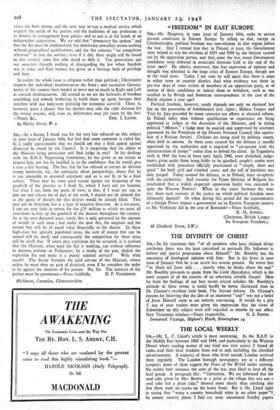Snt,—As a doctor, I thank you for the very fair
editorial on this subject in your issue of January 16th, but feel that some comment is called for. Is it really unreasonable that we should ask that a final appeal against dismissal be heard by the Courts? Is it surprising that we object to the Minister being prosecutor and final judge in one? In his dealings with the B.M.A. Notiating Committee, he has given us no reason to respect him, nor has he instilled in us the confidence that he would give a case a fair hearing. The fact that he has refused to correct an obvious wrong forthwith, viz., the ambiguity about partnerships, shows that he is not amenable to reasoned argument and so is not fit to be a final arbiter. There may be some good reason against my disposing of the goodwill of my practice as I think fit, which I have not yet learned, but what I see, from my point of view, is that, if I want my son to join me and relieve me of part of my work, I should not be allowed this as the quota of doctors for this district would be already filled. This may not be direction, but is a type of negative direction. As a tax-payer, I can see very little in return for the £55 million to which we must ati contribute to buy up the goodwill of the doctors throughout the country. As to the over-doctored areas, surely this is only governed by the amount- of wealth in such areas ; but under the new Act, the magnate and the errand boy will be of equal value financially to the doctor. In these high-class but sparsely populated areas, the sum of money that can be earned will be small, and consequently the competition for these areas will be small also. If salary plus capitation fee be accepted, is it realised that the Minister, when once the Act is working, can without reference to doctors; patients or Parliament, by a stroke of the pen, abolish the
capitation fee and make it a purely salaried service? With what result? The doctor becomes the paid servant of the Minister, whose orders he must obey on pain of disniissal, even if he considers the order to be against the interests of his patient. No, Sir. The interests of the
patient must be paramount.—Yours faithfully, H. F. VANDERMIN.
Mickleton, Campden, Gloucestershire.






























 Previous page
Previous page